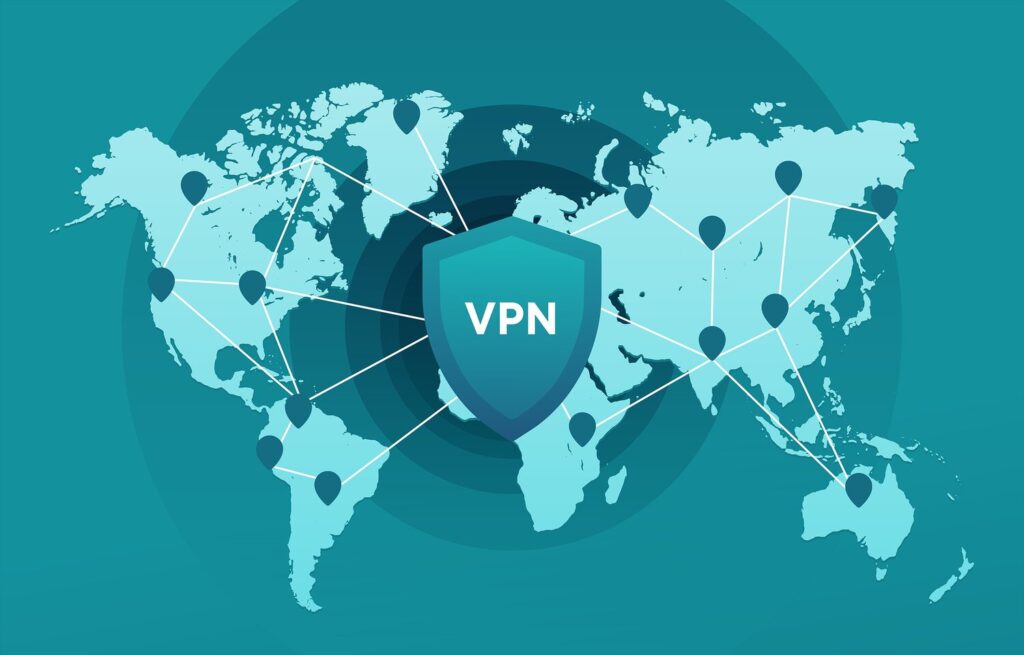
Hotspot Shield VPN Review – In-Depth Breakdown (2025 Edition)
In 2023, the market for VPNs was worth an estimated $42.4 billion. That figure is expected to grow in the next decade, hitting $133 billion by 2032.
It’s pretty easy to understand what’s driving this expansion. As the world becomes more aware of the way companies are monetizing private data, people are turning to VPNs to stop third parties snooping on their behavior.
For digital nomads, VPNs have another very handy function: they can help users bypass geo-blocking and government censorship. That means that no matter where you are in the world, you’ll still be able to use all the websites and apps that you like with complete freedom, without being fenced in by local restrictions.
Hotspot Shield has been offering a VPN service for around 20 years now, making it one of the longest-operating providers on the market. While the company has changed its corporate structure a few times over the decades, it has remained a trustworthy VPN.
In this post, we’re going to look at how Hotspot Shield stands out from the competition, while also assessing its speed and stability.
Company Background
Hotspot Shield has amassed more than 650 million downloads since it set up shop in 2005. It was the flagship product for AnchorFree, before the company was bought up by Aura in 2020 and rebranded as Pango.
Aura has since spun out Pango as a separate business, and today it offers a mixture of antivirus, identity theft protection and VPN services.
Given the brand recognition of Hotspot Shield, it’s not surprising that despite all the behind-the-scenes card shuffling, it has kept its name the same. It also remains based in the US, which might raise concern for some privacy-minded individuals, as we’ll explain further down.
At one point, Hotspot Shield was considered by some to be the best VPN on the market. That reputation has slipped a little in recent years, as other businesses have aggressively expanded their server network and switched to faster tunneling protocols.
That said, it is still a popular choice and continues to be a solid VPN option.
Core Features
There’s nothing overly flashy about Hotspot Shield, but it does offer the features that you would expect from a modern VPN. Given its part of Pango, it’s a bit surprising that it doesn’t have antivirus or ad-blocking features built in, instead focusing purely on the VPN functionality.
Security & Privacy
Hydra is Hotspot Shield’s proprietary protocol, designed so that data that passes through the tunnel looks like normal web traffic. This way, censors and websites hunting for VPNs are less likely to block the connection. It uses both AES-128 and AES-256 encryption, with AES-128 as standard.
The company has also recently introduced WireGuard on Mac and Android, though it’s not currently available on Windows or iOS. Some devices also still support IKEv2.
There is a no-logs policy in place, which means Hotspot Shield doesn’t track what websites and apps are accessed with the VPN. This was independently audited in 2023.
However, some data about your connection (e.g., timestamps, servers used) is recorded.
The VPN also boasts:
- Kill switch. This immediately severs your connection if the VPN temporarily drops, ensuring that none of your data is exposed.
- DNS leak protection. A feature of many VPNs, it prevents your internet service provider (ISP) from snooping on your browsing.
- DNS filtering. Hotspot Shield automatically blocks websites that have been flagged as containing malware, to prevent your devices from infection.
- TOR over VPN. Hotspot Shield supports the use of the Onion network to further obscure your online profile.
Performance & Server Network
There are more than 1,800 servers in Hotspot Shield’s network, spread across 80+ countries.
There’s a good range of locations on offer for premium users in North America, Europe and Asia, with a more modest presence in Africa and the Middle East. Some specific servers are optimized for streaming, gaming and social media.
When you connect, you can see the server load as a percentage, so that you can avoid servers that are experiencing high demand.
Free users are limited to 3 or 4 server options but still get some choice, which is better than other free services, including the one offered by Bitdefender.
Unlike some VPN providers, Hotspot Shield’s servers are not all 10 Gbps, which means their maximum bandwidth is lower. On a high-speed connection, you’re not going to be ripping out the 950+ Mbps that operators like Surfshark and NordVPN can achieve.
At the same time, as a digital nomad those speeds are probably not going to be feasible anyway, unless you’ve sprung for a very fancy internet package at your temporary digs.
With our 100 Mbps connection, we were able to reach around 95 Mbps consistently when connecting to a nearby server. Connecting to the US (where Hotspot Shield has most of its servers), the speed remained stable at around 92.5 Mbps, which isn’t much of a drop off.
The latency (the time it takes for data packets to travel) increased quite a bit when the VPN was connected, even on a local server, but not so much that we noticed performance issues while browsing.
Special Features
Hotspot Shield offers split tunneling, but only through its Hydra protocol. This lets you choose which apps and websites go through the VPN and which ones don’t.
It’s possible to choose whether you want traffic to route through the VPN or to bypass the VPN by default. In other words, you can either have the VPN on for everything, but with a few exceptions for websites that are loading slowly; or you can have the VPN off for everything, except with a few exceptions for websites where you desire a bit more data privacy or anonymity.
Traffic obfuscation is always on, which helps to circumvent firewalls designed to identify and block VPN traffic.
There are also numerous auto-connect options that can be toggled, including switching the VPN on when the phone starts up or when the app launches. It’s also possible to set the VPN to activate when it connects to a specific type of connection (e.g., unsecured, mobile data).
Conversely, the VPN can be set to turn off when your smartphone enters sleep mode to conserve battery life.
Speed, Streaming & Torrenting Performance
We had a pretty good experience with Hotspot Shield. While it might not be the fastest on the market, our connection was stable and consistent across browsing, streaming and torrenting.
Speed Test Results
Speed is incredibly relative depending on where you are in the world, the time of day that you connect and what servers you are trying to access. Overall, though, we experienced only a very small percentage decrease in speed across all our tests.
Connecting from Europe, we started by connecting to a UK server. In a couple of tests, our download speed was actually faster when connected to the VPN, but on average there was a small slowdown.
Downloading: 3.4%
Uploading: 4.09%
Latency: 100%
Next, we connected to a US server, which also performed extremely well with download speeds, although upload speeds were poor and the latency was (expectedly) higher.
Downloading: 7.4%
Uploading: 41.36%
Latency: 530.77%
The biggest surprise was how fast the connection speed was using a Singapore server. Most of our tests with VPNs show a markedly worse experience using Asian servers compared to US servers when connecting from Europe, but Hotspot Shield performed exceptionally well.
Downloading: 6.84%
Uploading: 37.27%
Latency: 2,123.08%
We were so surprised by this, we even did extra tests, but aside from the inevitable latency issues with connecting to a location so far away, the speeds held.
Streaming & P2P Support
Hotspot Shield has servers that are specifically designed to facilitate streaming, but even on a non-optimized server we were still able to unblock Netflix, Amazon Prime, Disney+ and BBC iPlayer.
There were no issues with buffering at all, regardless of whether we connected to a US server or a UK server. The connection wasn’t quite as stable when connecting to a Singaporean server, but it was still fine on full HD.
While there’s no official torrenting support on Hotspot Shield, all its servers allow P2P traffic. We didn’t have any issues with speeds when connecting to a local server, even though Hotspot Shield doesn’t allow port forwarding.
Security and Data Protection
Hotspot Shield’s tunneling protocols provide a good balance of speed and security, although it’s no longer top of the line.
Encryption & VPN Protocols
Most of Hotspot Shield’s VPN connections are made using Hydra, Hotspot Shield’s proprietary protocol. The company designed it specifically to offer faster speeds than OpenVPN, while still maintaining a secure connection.
At one point, Hydra put Hotspot Shield at the forefront of the market, but the protocol has since been superseded by the super lightweight WireGuard, which is the gold standard for VPNs at the moment.
Hotspot Shield does allow users to choose to connect via WireGuard instead of Hydra on some devices, but Hydra is still the default option.
For encryption, the company uses as standard 128-bit AES, which is widely considered secure from brute-force attacks for the foreseeable future.
On the other hand, VPN providers like Proton and Surfshark have already upgraded their ciphers to the more advanced 256-bit AES, which is meant to be more resistant to quantum computing attacks. Hotspot Shield also uses this for some connections but not all of them.
No-Logs Policy & Audit History
Hotspot Shield doesn’t store any logs relating to your browsing habits, such as what websites and apps were accessed via the VPN.
However, it does collect diagnostic data about what devices you use, how much bandwidth you take up and what servers you access.
The company’s privacy policy essentially states that this information will be stored for an indefinite amount of time – though of course you can request deletion under the data-protection laws of your country.
Free users can expect some of the data that Hotspot Shield collects to be shared with third-party advertising networks. That’s not ideal, but it is the “price,” so to speak, for getting a subscription-less service.
Hotspot Shield’s privacy claims have been validated by a third-party audit, which was conducted by Aon. However, this took place in 2023.
Unlike VPN providers such as NordVPN and Proton, there doesn’t appear to be any plan to make auditing a regular occurrence. Given the ever-changing cyber landscape, that’s something to consider if you are big on privacy.
Jurisdiction & Privacy Implications
Speaking of privacy, Hotspot Shield is based in the US, which has one of the worst reputations for data protection in the world.
One of the things that often worries privacy-minded individuals is that US-headquartered companies can be compelled to store user data through secret court orders. So, even if Hotspot Shield claims not to store browsing logs, it could be forced to do so by a judge, while at the same time being unable to reveal it has been compelled thanks to a binding gag order.
This practice isn’t allowed in many European countries, such as Sweden and Switzerland.
The US is also part of multiple intelligence-sharing outfits, which means any data it gathers could also wind up in other nations worldwide.
Pricing and Subscription Plans
Hotspot Shield keeps things simple with just one paid plan, in addition to its free option.
Plan Breakdown
Basic allows access to a small number of servers, which means that you should expect slower speeds since there are fewer options for load balancing.
Free users are forced to accept trackers and ads from Hotspot Shield’s partners in exchange for complimentary access.
On the plus side, features like the kill switch and split tunnelling are still included.
Premium lets subscribers choose from the full range of 80+ available countries. Up to 10 devices can be linked to one plan, with 24/7 support through Hotspot Shield’s live chat function.
There are no ads and no trackers.
Single-month subscription: $9.99.
12-month subscription: $6.66 per month ($79.99 total).
A 7-day free trial is available. This will automatically transition into a subscription unless you cancel at least 24 hours before the trial expires.
Payment Options & Refunds
Hotspot Shield only accepts credit cards or PayPal. It’s also possible to purchase a subscription through the Google Play Store and the Apple App Store.
The company has one of the most generous money-back offers on the market. Subscribers can request a full refund for any reason within 45 days. That’s more than the 30 days offered by NordVPN, Surfshark and ExpressVPN.
Refunds must be requested by email or live chat, although subscription renewals can be canceled easily using the Hotspot Shield account portal.
Customer Support Experience
Hotspot Shield has a marvelous support center that divides its help guides by device type. There’s also a general FAQ section with posts related to payment, device management and troubleshooting.
If this doesn’t help, there’s a support form that you can fill out, detailing your issues.
The fastest way to get in touch though is to use the 24/7 live chat feature. Like most VPN providers that have this function, Hotspot Shield’s version defaults to a chatbot but offers a human representative if things go wrong.
We had to wait less than a minute to be connected to a person, which is pretty good going – in our book, that certainly fits the advertised 24/7 service!
The downside is that live chat is only available to Premium subscribers. Free users can only wait for an email response to their support form enquiry.
Pros and Cons
Pros:
✅ No-logs policy
✅ 24/7 chat support with Premium
✅ Covers up to 10 devices with Premium
✅ Good-quality free VPN
Cons:
❌ Relatively expensive premium plan
❌ Doesn’t regularly audit logging policy
Comparison With Other VPNs
| Download/Upload Speed Loss | Number of Servers | Netflix Access | Price Per Month (Annual Subscription) | |
| Hotspot Shield *Premium | 7.40% / 41.36% | 1,800 | Yes | $6.66 |
| NordVPN *Plus | 5.34% / 3.39% | 7,525 | Yes | $5.99 |
| Surfshark *Surfshark One | 7.72% / 32.24% | 3,200 | Yes | $3.39 |
| Proton *VPN Plus | 5.49% / 2.15% | 12,072 | Yes | $4.99 (includes VAT) |
*We’ve selected the midrange option for each service listed above, rather than the basic or premium plan. Speeds and prices will vary according to geography.
Hotspot doesn’t offer as many servers as the top dogs. It’s also not setting speed records with its download or upload rates.
However, it’s not far off the pace, and we didn’t have any issues completing any of our browsing, streaming or torrenting tests.
The apps come with the kind of features that we would expect as standard, such as a kill switch, split tunneling and auto-connect settings. There’s nothing especially unique though, aside from the proprietary Hydra protocol – and this is arguably less impressive than the widely available WireGuard.
We do have some concerns over the infrequency of its third-party auditing, and its logging policies could do with being a little more transparent.
While its monthly subscription rate is on the cheaper side, its annual subscription rate is pricier than most of the competition.
User Reviews and Ratings
Hotspot Shield scores a respectable 4.1/5 on Trustpilot, which is lower than Surfshark and ExpressVPN but higher than Proton and Mullvad. The story is similar over on the Google Play Store (4.4/5) and the Apple App Store (4.5/5)
What people like:
The quick customer service. Premium users note that reps reply promptly on the live chat as well as through email.
The server locations. Hotspot Shields has strategically located servers throughout the world, including Africa and the Middle East, to speed up regional connections.
A solid free service. Despite the limitations of the free tier, reviewers still rate it highly compared to competitors.
What people don’t like:
The glitchy mobile apps. The Android and iPhone applications sometimes have to be closed and reopened to function.
The renewals process. Several customers have complained that Hotspot Shield don’t supply adequate reminders related to auto-renewals.
Final Verdict & Recommendation
Hotspot Shield does everything well, from its overall speeds to its streaming optimization. The company might not have the most servers on the market, but it has a decent network, which it has spread pragmatically across different geographies.
Its free VPN is probably one of the best that we’ve tried on the market. There is the trade-off with privacy and the way it sells data to advertisers, but that’s (unfortunately) par for the course with most free VPNs.
The big question mark for us though is why you would pay for Hotspot Shield’s upgraded plan when its service isn’t demonstrably better in any way than the competition. We did enjoy good speeds with the Premium VPN, but not more so than cheaper and equally well-reviewed options like Surfshark or NordVPN.
Of course, it might be that users in certain regions find Hotspot Shield works better than the alternatives. We were particularly impressed with the speed of its Singapore server, and people accessing the service from Asia generally seem to rate the company highly.
One thing is definitely true: Hotspot Shield has one of the most generous money-back guarantees on the market. With that in mind, we’d say it’s worth taking advantage of the 45-day refund window to explore whether the product works best for you in your geography.








Responses